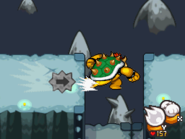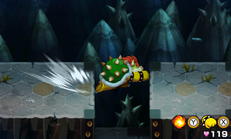Sliding haymaker: Difference between revisions
m (TheFlameChomp moved page Sliding Haymaker to Sliding haymaker: Correct capitalization, according to the talk page) |
|||
| Line 17: | Line 17: | ||
|JapR=Arukinagara panchi | |JapR=Arukinagara panchi | ||
|JapM=Punch while walking | |JapM=Punch while walking | ||
|FraE=Poing glissé | |||
|FraEM=Sliding fist | |||
|Ger=Schlitterschlag | |Ger=Schlitterschlag | ||
|GerM=Slide Punch | |GerM=Slide Punch | ||
Revision as of 04:29, February 24, 2023
- “It's just a theory, but I think if he blue, he'll punch much harder than before!”
- —Toadbert, Mario & Luigi: Bowser's Inside Story
The sliding haymaker, also called the sliding punch,[1] is one of Bowser's moves in Mario & Luigi: Bowser's Inside Story and its 3DS remake, Mario & Luigi: Bowser's Inside Story + Bowser Jr.'s Journey. Bowser learns this move after Mario and Luigi defeat Durmite in Bowser's Nerve Cluster. They head further in the area when a lot of Biffiduses drill down the ice the brothers are currently on, dropping them onto a small area. In this place, they find Toadbert, who is studying a nubbin, which Luigi hits, giving Bowser a tingling feeling in his arm. Toadbert tells them what he believed happened. With this move, Bowser is able to continue his journey.
To perform the move, the player must punch normally using the ![]() button, and hold down the
button, and hold down the in the direction they want Bowser to move. This move can be used to cross ledges that Bowser would normally be unable to cross on his own (called "Slide Fit" by a sign in Bumpsy Plains), move across treadmills in the opposite direction (called "Treadmill Fit" by a sign in Bowser Path), and break bigger rocks than possible with a normal punch.
Names in other languages
| Language | Name | Meaning | Notes |
|---|---|---|---|
| Japanese | 歩きながらパンチ[?] Arukinagara panchi |
Punch while walking | |
| German | Schlitterschlag[?] | Slide Punch | |
| Italian | Super Pugno[?] | Super Punch |
References
- ^ Mario & Luigi: Bowser's Inside Story instruction booklets, page 21 (American) and page 22 (European)

